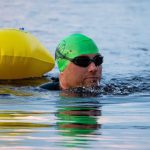Enter the mental tell…
Do you have a mental tell when you’re really tired? Mine is looking down into the river, lake, ocean or pool and wondering how far I will fall if I stop swimming. Morbid, I know. And a ridiculous idea. Physically, the human body contains too much air to sink to the bottom of a waterbody. Practically, I would never let myself drown.
I first experienced this feeling in August 2011. It was only my second year of open water swimming when I entered a Toronto triathlon with a 750-metre swim in Lake Ontario. I train in Lake Ontario – it’s usually lovely. But this weekend was different. This was the weekend that Hurricane Irene hit the eastern United States.
Lake Ontario lies on the Canada-US border so a weather disruption of that magnitude hitting New York was felt across the lake. Overnight, the water went from calm and blue in the mid-20s, to raging black waves in the high teens.
Swimmers didn’t fare well. Several people were pulled out with hypothermia. Those that stayed in, struggled against the waves. I powered through. But I was scared. My brain confused nerves at the sudden difficulty of the swim with real danger and I had to realise the difference.
Over the past four years, I’ve gotten better at handling my nerves but they never go away, especially when an event is more challenging than I expected.
This is what happened on day three of my eight-day 22-mile swim for the Diabetes UK swim22 challenge. Signing up, I thought it would be an easy way to give structure to my winter training. I underestimated it. Pool swimming is easier than open water but 5,000 metres a day is significant. I was tired after day one, sore after day two and exhausted by day three!
Enter my mental tell.
My friends told me to slow down. But endurance athletes don’t give up that easily. I didn’t have a coach encouraging me back into the water this time, but I’m mentally strong. And I finally appreciated the difficulty of the challenge. I went into the pool on day four mentally prepared! The remaining five days passed in flash.
Having now finished all 22 miles, I’m pleased with how much I learnt. I broadened my experience of dealing with the big swim problems – fatigue, boredom and nerves – and I learnt how to be a pool swimmer. I can now control my pool rage (use it as fuel to pass slow, irritating swimmers), properly secure a swim cap (pull it down well over my ears), deal with an underwater mp3 player (ditch it) and not confuse the lap-counting Garmin (actually, I’m still confused by that one).
So what I took on as a little winter activity became a challenging learning endeavour. But I made it through. And now I’m better prepared for my next event – the 2swim4life two-person 24-hour 24-mile relay at Guildford Lido. Me and my nerves agree, bring it on!






